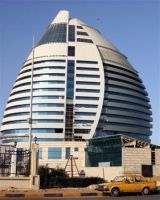Sudan: Construction industry has limited health safety, environment policy
By Yazeed Kamaldien
December 30, 2007 (KHARTOUM) — An oil-fuelled construction boom is giving Sudan’s capital, Khartoum, an ever shinier veneer. However, some fear that this building spree is taking place at environmental cost.
 “The construction industry is changing land use. They’re cutting the green areas in Khartoum and creating residential areas. It’s not very well planned, and is already having a negative impact on the quality of water and soil. The long term danger is that it will lead to water scarcity and other socio-economic and health impacts,” says Mohamed Elmuntasir Ahmed, professor at the Faculty of Engineering and Architecture at Khartoum University.
“The construction industry is changing land use. They’re cutting the green areas in Khartoum and creating residential areas. It’s not very well planned, and is already having a negative impact on the quality of water and soil. The long term danger is that it will lead to water scarcity and other socio-economic and health impacts,” says Mohamed Elmuntasir Ahmed, professor at the Faculty of Engineering and Architecture at Khartoum University.
In the absence of guidelines to regulate which building products can be imported, certain contractors are using hazardous materials, he adds.
“These materials will introduce chemicals that can harm the environment and the health of residents. We find that flame retardants used in construction are sources of toxins that can be transferred through the mother’s breast milk to infants. It can also cause cancer. The atmospheric environment is also affected by these chemicals.”
Furthermore, “Construction trends currently allow for too much space between buildings. If buildings are built closer to each other they could conserve cool air better. But they’re not and that means we need more electricity to keep air-conditioning running to keep buildings cool. That also creates more pollution,” says Ahmed, who also serves as a consultant with the university’s environmental watch group, and has worked on feasibility studies for various construction projects in Sudan, ranging from factories to foreign embassies.
These views are echoed by Sharaf Bannaga, the owner of Bannaga Consulting, who served in Khartoum State’s public utilities department from 1989 until 2001.
“Contractors have the freedom to do what they want. They’re not thinking about how they’re endangering the environment. The government runs everything. Once you have its approval nobody cares, and nobody’s supervising the government.”
Ahmed agrees that government’s control over construction needs to improve: “There’s a gap between legislation and the monitoring of projects. We also have legislation that is out of date. We need new legislation that can be applied and enforced.”
But, he says, it must be remembered that environmental management is still in its infancy in this country. “Sudan’s environment ministry was launched only in 1995. It hasn’t had much time but is working very hard. It needs more time to establish and enforce a complete system.”
Bannaga points out that the disregard of the construction industry is part of a broader tendency to sideline the environment in a country that is grappling with widespread poverty — as the shantytowns of Khartoum can attest.
“We…have difficulty in treating water and waste water. Most households provide their own means of discharging waste water into sub-surface soil and water. There are no waste water networks,” he explains.
“We also don’t have systems for refuse collection in many areas. Most of our solid waste is burnt on the ground. We’re dependant on mechanical air-conditioning and there’s no eco-building.”
Many of those who are poor depend on the natural environment for their livelihood, Bannaga says. “But they also aggravate environmental problems. Someone who is poor cuts down trees to sell wood, and nobody’s replanting the trees.”
Embroiled in a war with the southern Sudan People’s Liberation Movement until 2005, Sudan’s government now finds itself battling rebels in the western region of Darfur — and international condemnation for the war crimes it is accused of perpetrating in the course of this conflict. However, this has had little effect on investment in Sudan.
In addition to environmental sustainability, the matter of land rights has also proved something to be grappled with in the development of Khartoum: take the efforts to construct bridges to Tuti Island.
This project aims to link the Nile River-embedded island with the capital, which surrounds it. A road will also be built across the island to connect the two bridges, and provide another traffic route to ease congestion in the growing metropolis.
The 14 million dollar initiative started in 2003, and was on track until a 13 month delay over the island road.
“We had to stop the project when residents said the road would cross over their land. They wanted a lot of money for the land and we spent all that time negotiating with them. We made a compromise and they agreed with us,” says Abdelwahid Abdelmoniem Abdelaziz, who heads the Roads and Bridges Department at Khartoum State’s Ministry of Physical Planning and Public Utilities — and is in charge of completing the ambitious project.
He says that his division makes all contractors aware of Sudanese environmental laws. In addition, “We have a department concerning the environment and it has its own court to judge whether contractors have not obeyed the law.”
But for Bannaga, there is clearly a need for greater oversight. “There might be legislation,” he notes, “but there’s no rule.”
(IPS)
